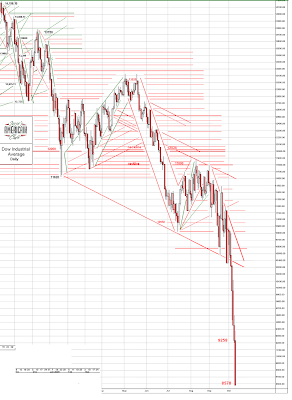In our recollection Canada's banking system was also fairly sound during the Great Depression.
Canada rated world's soundest bank system
By Rob Taylor
Thu Oct 9, 2008 2:41pm EDT
CANBERRA (Reuters) - Canada has the world's soundest banking system, closely followed by Sweden, Luxembourg and Australia, a survey by the World Economic Forum has found as financial crisis and bank failures shake world markets.
But Britain, which once ranked in the top five, has slipped to 44th place behind El Salvador and Peru, after a 50 billion pound ($86.5 billion) pledge this week by the government to bolster bank balance sheets.
The United States, where some of Wall Street's biggest financial names have collapsed in recent weeks, rated only 40, just behind Germany at 39, and smaller states such as Barbados, Estonia and even Namibia, in southern Africa.
The United States was on Thursday considering buying a slice of debt-laden banks to inject trust back into lending between financial institutions now too wary of one another to lend.
The World Economic Forum's Global Competitiveness Report based its findings on opinions of executives, and handed banks a score between 1.0 (insolvent and possibly requiring a government bailout) and 7.0 (healthy, with sound balance sheets).
Canadian banks received 6.8, just ahead of Sweden (6.7), Luxembourg (6.7), Australia (6.7) and Denmark (6.7).
UK banks collectively scored 6.0, narrowly behind the United States, Germany and Botswana, all with 6.1. France, in 19th place, scored 6.5 for soundness, while Switzerland's banking system scored the same in 16th place, as did Singapore (13th).
The ranking index was released as central banks in Europe, the United States, China, Canada, Sweden and Switzerland slashed interest rates in a bid to end to panic selling on markets and restore trust in the shaken banking system.
The Netherlands (6.7), Belgium (6.6), New Zealand (6.6), Malta (6.6) rounded out the WEF's banking top 10 with Ireland, whose government unilaterally pledged last week to guarantee personal and corporate deposits at its six major banks.
Also scoring well were Chile (6.5, 18th) and Spain, South Africa, Norway, Hong Kong and Finland all ending up in the top 20.
At the bottom of the list was Algeria in 134th place, with its banks scoring 3.9 to be just below Libya (4.0), Lesotho (4.1), the Kyrgyz Republic (4.1) and both Argentina and East Timor (4.2).
World Economic Forum Global Competitiveness Report
RANKINGS
1. Canada
2. Sweden
3. Luxembourg
4. Australia
5. Denmark
6. Netherlands
7. Belgium
8. New Zealand
9. Ireland
10. Malta
11. Hong Kong
12. Finland
13. Singapore
14. Norway
15. South Africa
16. Switzerland
17. Namibia
18. Chile
19. France
20. Spain









































